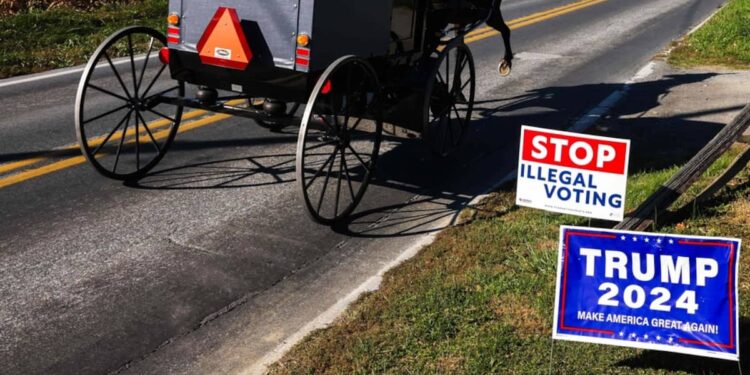It feels like we’re in another era, where the sun punctuates the work in the fields and where straw hats adorn men’s hair. But in front of Amish farms in the valleys of Pennsylvania, Trump signs betray the current torments: America is preparing to vote.
Among the Amish of rural Lancaster County, the election is within sight, but far from the faith-filled heart: a large majority do not vote, their church often discourages them from doing so.
“God takes care of all that. He knows who he chose to be the next president, so I don’t worry about it. I leave it to him,” says Leroy Stoltzfus, 84, in a calm voice, sitting in his small living room.
Leroy Stoltzfus
Photo Paul NOLP / AFP
For this retired farmer, with a reserved smile and a white beard, the election is “a major issue”. However, he prefers not to share his opinion on the two candidates, Republican Donald Trump and Democrat Kamala Harris.
No car, internet, or, very often, telephone. Modernity remains at the community’s doorstep, but Republicans see it as a pool of votes: in 2020, Biden beat Trump narrowly in Pennsylvania, by some 80,000 votes. Now, that’s the number of Amish who live there.
The Republicans “are interested in them because, traditionally, they adopt conservative political positions”, against abortion or homosexual marriage, and judge this party “less likely to intervene in their way of life and their businesses”, underlines Professor Kyle Kopko, specialist in this community at Elizabethtown College.
To convince them to mobilize, conservative activists go door to door and encourage them to register to vote. Trump even recently held a rally in Lancaster.
“In a state like Pennsylvania, every vote counts. And then it’s betting on the future,” because the number of Amish doubles every 20 years, underlines Professor Kopko.
Photo Paul NOLP / AFP
“Question of truth”
The sun casts its last orange rays over the county’s countryside, home to the largest contingent of Amish in the country. The farm smell wafts from the stables. Laundry, suspended from immense threads, flies in the wind between large grain silos.
Paul Bilier, 34, ends the day as he started it: milking cows. His large hands covered with earth betray his work in the fields, his brown eyes tinted with green his kindness.
“Trump is strong! For him, business is business,” the farmer said with a smile. He sometimes talks about politics with his neighbors. “I heard that Biden was too old, but hey, I don’t know much,” admits this father of two, who grew up three kilometers away.
Linda, tanned and rectangular sunglasses, sells ice cream, cheese and milk in a small shop. Vote? “It’s quite a debate in the community, some do it, some don’t. My husband and I vote. It’s a question of truth and justice,” asserts, with a closed face, the one who will choose Trump on November 5.
“Not an Amish thing”
In markets, the Amish run food stands and are in regular contact with people outside the community.
Some even have smartphones, like Sam Stoltzfus, who runs a production of horseradish, a root often used as a substitute for mustard. Every morning, he listens to the conservative Fox News channel for 10 minutes.
However, he does not hold his tongue in his pocket when it comes to Trump. “He can manage things, but he is still not very Christian as president,” declares this 81-year-old man, short and lively, with a hoarse voice.
“He has I don’t know how many millions of dollars in assets, and how many times has he gone bankrupt?” asks this father of nine children, who has 54 grandchildren.
“And this shady thing also happened after the election” of 2020, he says again, about Trump’s refusal to recognize his defeat.
Harris? “It’s the lesser of the two evils.”
“We should all vote,” says Sam Stoltzfus, in his barn filled with collectible clocks. “But it’s not really an Amish thing.”



